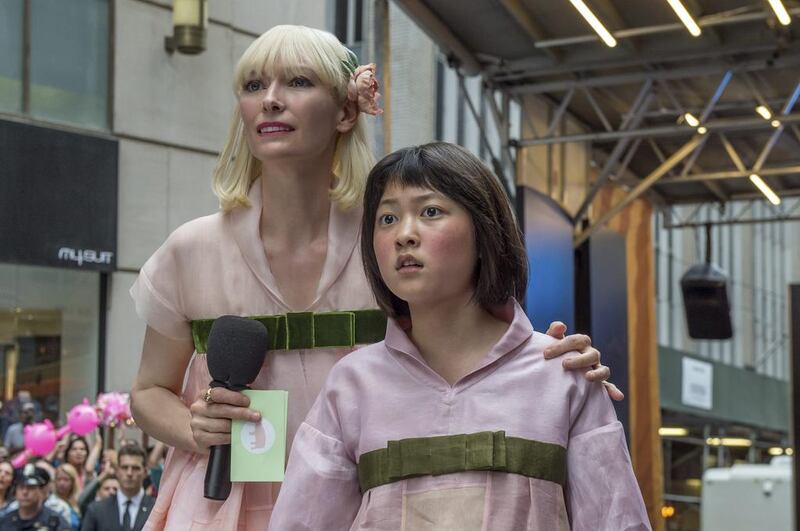It will be hard to find a wackier film about the ills of mass-market meat production than Okja.
South Korean director Bong Joon-ho – Quentin Tarantino has compared him to Steven Spielberg – is a master of mixing genres and tonal shifts. He specialises in fantasy films with messages for adults – as seen in his 2013 class-warfare, climate-change sci-fi thriller Snowpiercer.
As with his 2006 hit, The Host, Okja uses an outlandish creature to highlight ecological concerns. It stars Tilda Swinton, reunited with Bong after a memorable role in Snowpiercer, as Lucy Mirando, the neurotic, dastardly new chief executive of the Mirando Corporation. In creating the character, Swinton says she had several characteristics in mind.
“She is part ‘vestigial virgin’, part Barbie doll, part spa manager,” says Swinton. “But that sort of sense of her being super-wholesome, it’s all a facade.”
Mirando has a plan. She will rehabilitate the evil reputation of the company she has inherited by giving it a new, eco-friendly makeover by genetically engineering a new breed of super-animals that will reduce food costs and leave no environmental footprint. In this way, it will feed the world – and entertain it, too, through a popular reality-TV show based around the animals.
Twenty-six of these new, genetically modified animals are sent around the planet and raised in a variety of environments for 10 years to see what conditions best enable them to grow bigger, fatter and tastier.
In South Korea, a sweet, innocent girl, Mija (Ahn Seo-hyun), has made a pet of her creature, giving it the name Okja. We see them playing in the countryside, helping each other out of tight spots.
The creature is a marvel of CGI – part pig, part dog, the size of a hippo, with furry skin and an amenable, doting personality. It was brought to life by visual-effects supervisor Erik De Boer, who also worked on Life of Pi.
Bong is full of praise about the details involved in the creation of Okja.
"While the audience looks at the outer exterior of Okja, the VFX team always looks at the bone structure, the fat and the ligaments," he says. "Erik really refrained from making the character look like a Disney cartoon."
When Mirando recalls the animals, the company runs into problems. Mija doesn’t want to let Okja go and joins forces with a group of bumbling, well-intentioned animal-rights activists played by Paul Dano, Lily Collins and Steven Yeun, who believe the corporation is exploiting animals and food for its own ends, and uncover the poor way in which it treats the animals.
“Once you understand the issues and do the research, you can be a more conscious consumer,” says Dano.
But the film goes out of its way to show that the activists have their own foibles and problems which, in their own way, are just as troubling and ruthless as those of the food corporations.
The film is not trying to convert the audience to veganism, but it does aim to raise awareness of some of objectionable corporate behaviour.
"I'm not vegetarian, but it certainly talked to me about the complexity of the issues surrounding the food industry," says former The Walking Dead star Yeun.
More: A glimpse at Bong Joon-ho's Okja - in pictures
How best to feed more than seven billion people is a complex question and one that does not have easy answers. Can we do so ethically? That is the dilemma at the heart of Okja.
“I don’t have a problem with people eating animals. After all, animals eat animals – we are carnivores,” says Bong. “In the pre-capitalist era, the way we prepared the food and ate it was fine by me, but once mass production and capitalism was introduced, it consumed the animal consumption business and problems started to arise.”
Bong visited an abattoir in Colorado while writing Okja, and was shaken by how even an organically reared cow was dissembled and packaged into food using cold, metallic machinery.
“When you see that in person, it is very shocking,” he says.
Yet the beauty of Okja is that it is, first and foremost, a movie designed to entertain and make us laugh. There is a host eccentric supporting characters, not least Dr Johnny Wilcox, a zoologist who is the public face of the Mirando Corporation.
The role is played by Jake Gyllenhaal, sporting a furry moustache and long shorts. He speaks in a high-pitched tone, taking his cue from watching children’s presenters on YouTube.
“It’s interesting in that world, to speak to children, there is a strange affectation that people seem to take,” he says. “We all seem to do it, in one way or another, and these bad performances just become magnified when they are television.”
He sees Dr Johnny as a Shakespearean figure.
“He has to turn himself into something that he’s not because he’s desperate for attention,” he says. “The audience hates him and he doesn’t mean to be hated – I kind of love that about the character.”
• Okja is available on Netflix from June 28.






